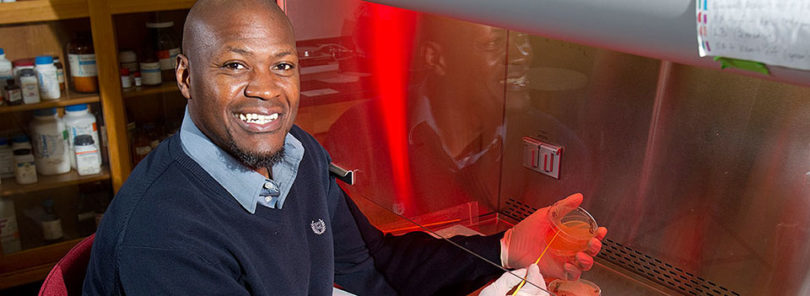Through his teaching, research and outreach, professor of plant pathology Ron Walcott aims to inspire students to be part of the solution to producing the food required to feed the world’s growing population.
Where did you earn degrees and what are your current responsibilities at UGA?
I earned my B.S. and M.S. degrees in plant pathology at Iowa State University and my doctorate at the University of Georgia. Currently, I am a professor of plant pathology and assistant dean for diversity in the College of Agricultural and Environmental Sciences. As a professor, I teach undergraduate and graduate courses and conduct research focused on plant pathogenic bacteria. As assistant dean, I supervise the CAES Office of Diversity Relations, which coordinates the recruitment and retention of underrepresented students and fosters an inclusive environment in the college. CAES-ODR also is responsible for a summer research internship program for high school students called the Young Scholars Program.
When did you come to UGA and what brought you here?
My wife, Yvette, and I moved to Athens in 1995 so that I could pursue my doctorate in plant pathology. My supervisor was located at the Coastal Plain Experiment Station in Tifton, Ga., so in 1997, I moved there to complete my research project. After graduating in 1999, I moved back to Athens when I was hired as an assistant professor.
What are your favorite courses and why?
My favorite course is PATH/ANTH 2010, “Plants, Pathogens and People.” This general course introduces students to plant pathology by exploring the historical, ecological and socio-economic importance of plant diseases. I love this course because students generally have no prior knowledge of, or interest in, plant pathology. However, after dissecting the Irish potato famine, the loss of the American chestnut to blight and other catastrophes caused by plant pathogens, they appreciate the direct and indirect impact of biology on their personal well-being. More importantly, it gives students interested in biology a nonmedical career option. I am especially pleased when students complete this course and subsequently enroll in other courses like “Fungi, Friends and Foes” as an expression of their genuine interest in plant pathology.
What interests you about your field?
Plant pathology is the study of the factors that lead to plant disease outbreaks. I have always been fascinated by inter-organismal interactions, in particular how different species establish relationships. Relationships between plant pathogens and their hosts can be highly destructive and short term or intricate and long term with barely noticeable negative effects. The sophistication of the mechanisms some plant pathogenic bacteria use to take advantage of the plant host cells and tissues is amazing. While scientists have unraveled a lot of the mystery behind these interactions, there is still much more to learn. With the scientific tools now available, scientists will be able to make significant progress in understanding plant pathogenesis. In short, this is a wonderful time to be a plant pathologist
What are some highlights of your career at UGA?
Highlights of my career at UGA include my involvement with the Lilly Teaching Fellows program, which provides select faculty an opportunity to enhance their pedagogy and improve the learning environment at UGA. I was selected as a Lilly Teaching Fellow in 2001 then served as the faculty affiliate to the program from 2007 to 2012. I also am proud to have been selected as a Senior Teaching Fellow in 2012.
How does your research or scholarship inspire your teaching, and vice versa?
I think that scientists generally do a poor job of attracting young people to careers in science. I try to use my research to attract students to nonmedical biological research. I use examples of plant disease research to inspire students to be part of the solution to producing the food required to feed the world’s growing population.
What do you hope students gain from their classroom experience with you?
I hope that my enthusiasm for plant pathology emboldens students to pursue careers in science. I hope they also recognize that they collectively hold the solutions to problems like climate change and food shortage and become empowered to start developing these solutions.
Describe your ideal student.
My ideal student is inquisitive, intellectually honest and hardworking. Students who give correct answers are fine, but those who come up with good questions get my attention.
Favorite place to be/thing to do on campus is…
… the Ramsey Center for Physical Activities playing pick-up basketball games. I have always been a “gym rat,” and the only time my brain takes a break is when I am physically active. I love the camaraderie of team sports.
Beyond the UGA campus, I like to…
… go on sightseeing road trips with my family, which includes my three daughters, Monica, Paige and Deneisha.
Community/civic involvement includes…
As assistant dean for diversity, I am heavily involved in recruiting underrepresented students to the College of Agricultural and Environmental Sciences. I do this in part by building relationships with teachers and administrators in middle and high schools that serve underrepresented groups in and around Athens. Our office hosts campus visits by various groups, and I speak to students about opportunities in our college. I also use my background as a plant pathologist to appeal to students who are interested in science careers.
Favorite book/movie?
“Things Fall Apart” by Chinua Achebe. This is a tragic story of a proud and successful Nigerian warrior during changing times in Africa. The main character, Okonkwo, espouses the values that are important for success in his village including being “manly” (physically strong and unyielding). Unfortunately, as times changed and British colonialists arrived in his village with a new religious doctrine, these same traits led to his ultimate demise. To me, it is a cautionary tale about being aware of one’s environment and adapting, when necessary, to survive.
Proudest moment at UGA?
… working with faculty and staff in CAES to bring about the largest increase in African-American and Latino undergraduate student enrollment in the history of our college.






